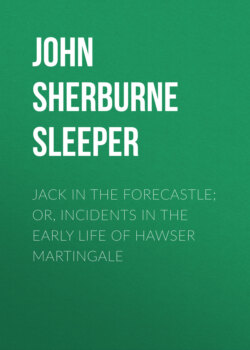Читать книгу Jack in the Forecastle; or, Incidents in the Early Life of Hawser Martingale - John Sherburne Sleeper - Страница 10
На сайте Литреса книга снята с продажи.
ОглавлениеThe gale continued unabated all night. Our vessel rolled heavily to
leeward, and strained considerably, her bulkheads groaning and her
seams opening, making it necessary to keep one of the pumps in constant
operation. As soon as it was daylight I went on deck, anxious to witness
a spectacle I had often heard described A GALE OF WIND AT SEA and it
wonder and admiration. The wind, blowing furiously, whistled
wildly among the rigging; the waves of alarming size and threatening
appearance, came rushing in swift succession towards us, as if eager to
overwhelm our puny bark, which nevertheless floated unharmed, now riding
on the crest of a wave, and anon plunging into a deep and angry-looking
gulf, taking no water on deck, excepting from an occasional spray.
I asked one of the sailors who had just taken a spell at the pump, if this were not a hurricane.
"Hurricane!" said he, with a good-natured grin. "Nonsense! This is only a stiff breeze. 'Tis as different from a hurricane as a heaver is from a handspike. When you see a hurricane, my lad, you will know it, even if the name is not lettered on the starn."
"Then I suppose there is no actual danger in a gale like this, although it does not look very inviting."
"Danger! I don't know about that. In a good seaworthy vessel a man is as SAFE in a gale of wind as if he was cooped up in a grog-selling boarding house on shore; and a thousand times better off in other respects. But this miserable old craft is strained in every timber, and takes in more water through the seams in her bottom than 'the combers' toss on her decks. If her bottom does not drop out some of these odd times, and leave us in the lurch, we may think ourselves lucky."
After uttering these consolatory remarks, accompanied with a significant shrug, he resumed his labors at the pump.
The wind blew with violence through the day, and the leak kept increasing. There is probably no exercise more fatiguing than "pumping ship," as practised with the clumsy, awkward contrivances called PUMPS, which were generally in use among the merchant vessels of those days. It being necessary to keep the pumps in constant operation, or in nautical parlance, "pump or sink," the crew, although a hardy, vigorous set of men, became exhausted and disheartened, and, to my astonishment and disgust, instead of manifesting by their solemn looks and devout demeanor a sense of the danger with which they were threatened, alternately pumped, grumbled, and swore, and swore, grumbled, and pumped.
Change is incident to every thing; and even a gale of wind cannot last forever. Before night the tempest was hushed, the waves diminished, and in a few hours the brig was under full sail, jogging along to the westward at the rate of six or seven knots. The next day we got soundings on the coast of Carolina, and, with a fair wind, rapidly approached the land.
Off the mouth of the bay which forms the harbor of Charleston extends a long line of shoals, on which the breakers are continually dashing. These shoals are intersected by narrow channels, through which vessels of moderate draught may pass at high water with a smooth sea. The principal channel, or main passage, for ships over the bar is narrow, and never attempted without a pilot. About three miles from the bar is the lighthouse, which stands on a low, sandy shore. Indeed, the whole coast is low and sandy, abounding in mosquitoes, sandflies, and oysters. Inside the bar there is good anchorage, but the tide at certain periods ebbs and flows with great velocity.
We crossed the bar, and, without anchoring, proceeded to the city. We passed Sullivan's Island on the right a long, low, sandy island, which is the summer residence of many of the inhabitants of Charleston. On this island Fort Moultrie is situated, which commands the passage to the city, about four miles distant. This fort proved an awkward obstacle to the capture of Charleston, when that feat was rashly attempted by Sir Peter Parker, during the revolutionary war.
On all the surrounding objects I gazed with a deep and intense interest, which was not relaxed until the Dolphin dropped anchor off the wharves of this celebrated city.
